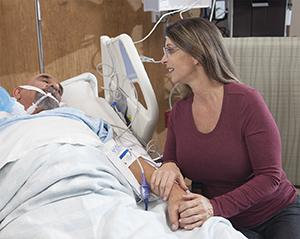You may go home the same day as your surgery, or you may need to stay in the hospital longer. These first few days after your surgery can be a challenge. You’ll have lots of help from your healthcare team. And you’ll learn how to care for yourself once you’re home.
Right after surgery
You’ll wake up in the ICU (intensive care unit). An IV (intravenous) line may be in your arm to provide fluids. You may have an air tube in your nose or a tracheostomy tube in your throat to help you breathe. You may also have a tube in your stomach to provide food. You may feel tired, confused, or groggy. This is normal. The confusion may last for a while. Your mouth or throat may feel dry or sore. Talking may be hard, so something to write with may be at your bedside.
Before leaving the hospital
Your healthcare providers will check on you after your surgery. They’ll explain what you need to do to recover at home. Have an adult family member or friend with you so any questions you have can be answered before you leave. Ask your family member or friend to write down the answers so you won't forget. You may be given medicines to take after you leave the hospital. Make sure an adult friend or family member is available to drive you home.
When to call your healthcare provider
Call your provider right away if you have any of these problems after surgery:
-
Bleeding or swelling in the mouth or throat
-
Fever of
100.4 °F (38 °C) or higher, or as advised by your provider -
Vomiting
-
Shortness of breath
-
Swelling in the legs or feet
-
Pain that’s not relieved by medicine
-
Symptoms that get worse or new symptoms
Call 911
Call 911 right away if you have:
-
Trouble breathing
Featured in


